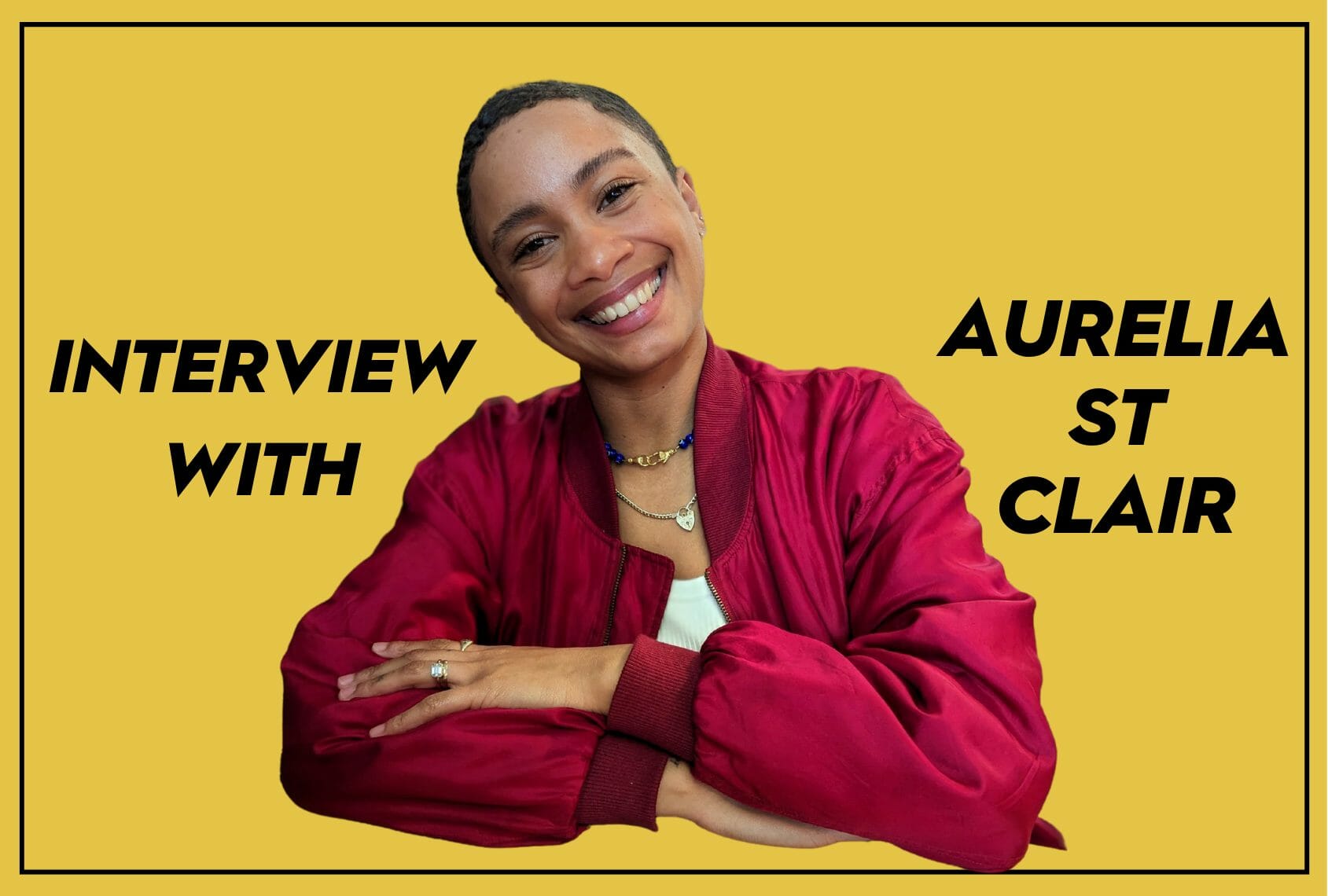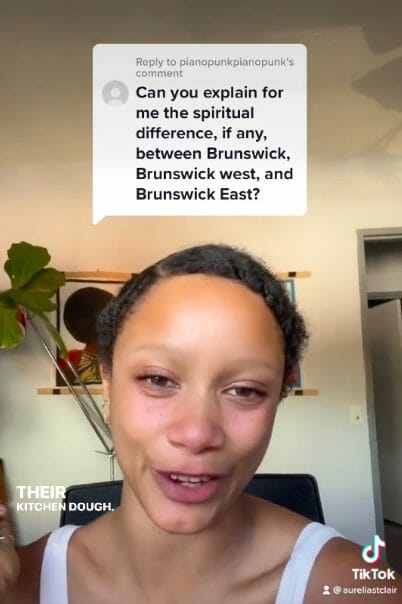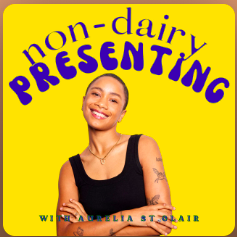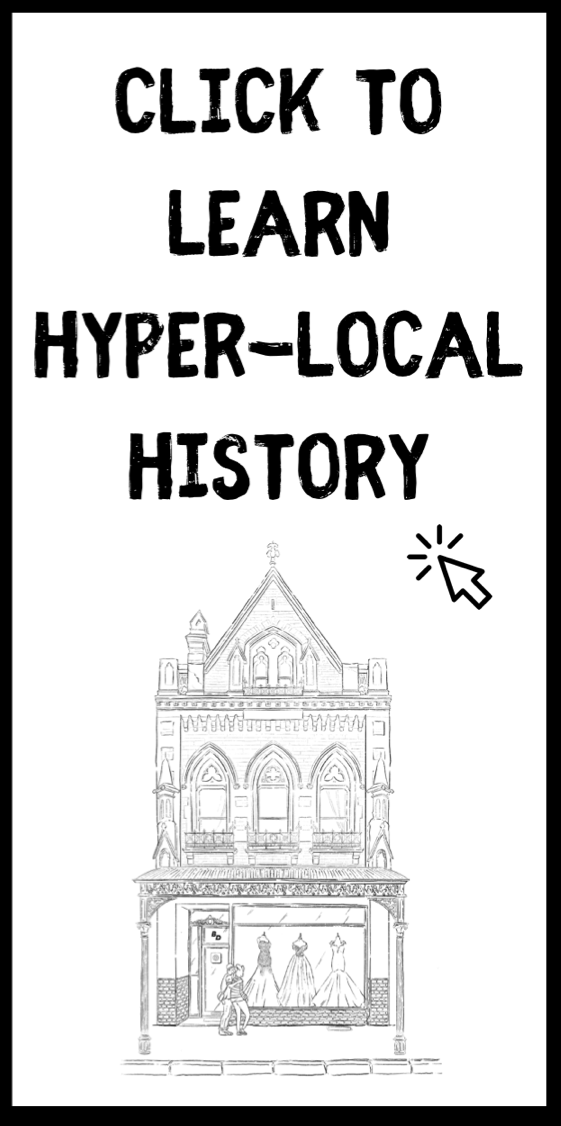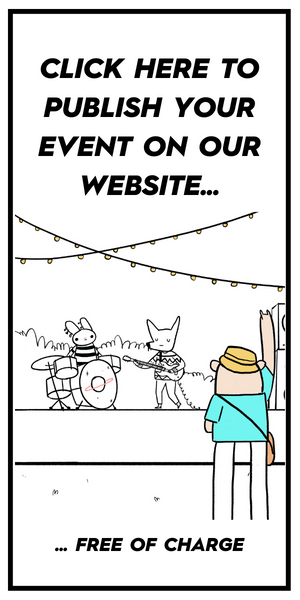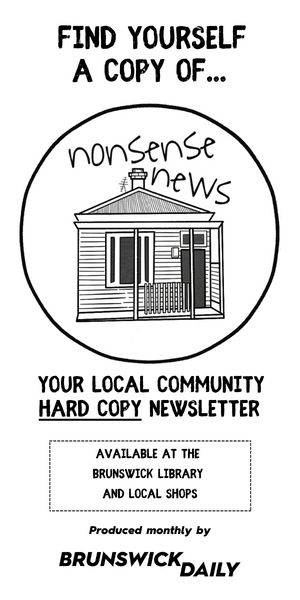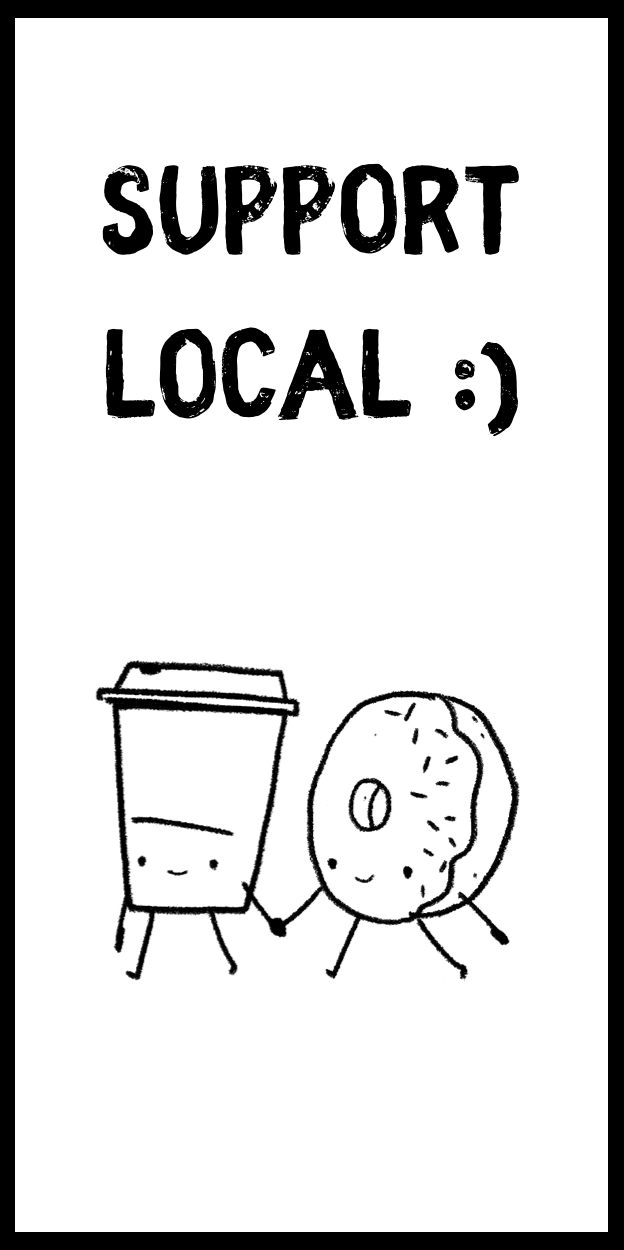As you’re about to read, my conversation with Aurelia St Clair was full of emotions, textures, colours and flavours. We basically small-talked ourselves into deep waters.
How’s your morning been? Crazy Melbourne weather, hey? Shall we order a coffee? (she had a Chai, I believe). All of a sudden, and almost without noticing, we were exploring depths, all types of depths.
Pablo (P): Do you think there’s a big connection between… I don’t know, being a podcaster, a model, and a comedian?
Aurelia (A): Let’s say you can learn things about comedy while doing modelling. Because you’re talking to different people or you have a funny thing happening at a [photo] shoot, or you can learn things about podcasting while doing a stand-up gig. Maybe I start talking about something on stage and I feel like I could flesh that out into an episode. So everything is connected that way. It’s about looking outside the linear things.
I run, for example. We think that to be a better runner you only run, but that’s not how it works because your body gets tired. I can get better at running by stretching. You need to stretch your muscles and you can get better at running by doing yoga, sleeping, or resting and I think that’s true for anything you’re doing.
A common question for people who do multiple things is what connects everything? I think the answer is YOU. What connects podcasting and modelling and podcasting, writing, modelling, and comedy for me, is that I’m doing it. It doesn’t have to be more than that.
P: In one of the episodes of your ”Non-dairy Presenting” podcast, you mention the term online persona. Do you think your online persona is too different from the offline one?
A: Yes. With some of my videos I’m only talking for 15 seconds to one minute, right? And there’s all these things that make an online video go well. If I’m talking about the differences between Brunswick, I can only say one or two things. So obviously, I’m not talking about all of Brunswick.
And then people are like “Oh, that was so mean!” or “Oh! but I live in Brunswick West and I don’t have a garden!”
I’m talking for 15 seconds so I’m gonna make some generalisations like if you live in Brunswick West, you have a big garden.
Sometimes I make more pointed videos. I’m like “if you live in South Yarra you don’t know how to use your indicator”. People get really angry but if I meet someone in South Yarra I’m not going to be like, “oh I bet you can’t drive!” you know? I’ll be like “oh hey, how are you doing?” Because I’m still a person talking to a person but when I’m making a snappy little video, I’m trying to be like maybe the meanest or quickest version of myself.
P: Was there a time while growing up when you identified you could play different characters? Were you mean to a classmate and realised that made others laugh?
A: Actually, I was really unpopular in school. I grew up in Germany in quite a small town and I wasn’t popular. I had two friends and we would just read books in the library. We read all the fiction-teen-romance type of books. So, sexiness but not actually. Whatever was popular like Twilight, Gossip Girl, all those things that were books back then.
P:Did that experience connect you to the different selves that you could be?
A:Yeah, definitely! Because you are a different person at school than you are at home. I think that’s true for most people.
P: One of the things that I really enjoy about listening to your podcast is your soothing voice.
On top of that, I truly enjoy your self-awareness and how open you are to being vulnerable. How did you get there? Was it a conscious decision to be open to the world?
A: Hmm, yeah! I don’t know any other way of being now, if that makes sense. I think it’s something I worked on because I was definitely a more closed-off person when I was younger. I’ve also just been through so much. I lost my mum when I was 15, I had a brother who also passed away when I was 15, and the relationship I had with my dad, for example, was never that great.
All these little things that happened while you were in those formative years, when you’re in your 20s -30s, they kind of stick with you and you can go a sort of one way or another.
One option is just to open yourself up, you know? And it’s really hard at first to admit that you’re just a flawed human being because vulnerability hurts. Especially once you start making things online and putting yourself out there because people have so many opinions and when you’re online, as you probably know, they feel like they can say anything that they wouldn’t say to your face and the only way to counter that by being open to sharing. It can be comedy as well, you can always reply with funny things.
You can be open, turn it back on them and be playful, or you can close. These are probably the three options. And the first two, I think feel better while the last one is still a valid response and sometimes I definitely close up. Recently, I’ve been making a lot less video content talking to the camera because I’ve just been feeling I can’t handle the negativity when it comes my way. And then other times I’m like, “I’m in a really good place, I’m gonna talk some s**t about Melbourne suburbs. Give it to me!” because I can respond in a way that I want to.
P: Another thing that came to my head while listening to you was how is your communication with Tamara?
Because if you’re getting out there saying this is me people! but at the same time, you have a partner who you share your intimacy with, how do you set the boundaries between you two?
A: We talk all the time. We talk so much and it’s something that I think happens when you interact a lot with someone. You have your brain, you have your partner’s brain, even with friends and co-workers, right? You now have a third brain, which is the one that you share.
So I’ll say something like, “Oh, we need to get eggs!” and she says “I’ve already put them on the list”, little things like that or when I’m craving a coffee she’d go “oh, I made you another coffee”.
We’re just both so open with everything including our phones. I love Reddit and read people complaining about their relationships and they’re like, “Uh he won’t show me his phone”, or “she’s hiding her phone”. She [Tamara] can take my phone and look at it anytime and I can look at hers.
It’s just something we look at together rather than separate. Let’s say I’m getting a bad message from someone and I go “oh my god, look at this!” and she can be supportive with “…they don’t get it, they don’t have a sense of humour!”, or whatever it is to make me feel better.
That kind of bridges the gap that I think could happen when, [um] I hate the word public figure, but I guess I’m a bit more of a public figure than her. She needs to know what’s going on there so that she’s aware of what’s going on in that part of my life.
P: Of course, because I guess people think they know you. And one of the things that I also appreciate a lot from your content is that even if, for whatever reason, you receive negativity you use tools like humour, kindness and caring and that’s really nice.
In one of your episodes, you talked about this guy asking on TikTok is it OK to be a straight white man in 2022? Tell me more about it.
A: Yeah, he deleted it but the video was so funny and so weird. But yeah, he was “is it okay to be a straight white man?”
He was saying “I like going to the gym. I like looking after myself” then he turns it around saying “Girls with coloured hair and no deodorant are hating on me” and I was like, well “I’m sure there’s somebody who’s loving you!” or I’m sure there would be someone if you didn’t talk s**t like this, you know?
So many gym bros have girlfriends, people who care for them, and love them. It’s not mutually exclusive. And this whole “us vs them”, “blue hair alternative vs gymbo who works out” but there’s people who mix both of those things I’m sure if you look for it, there’s gotta be!
I mean, of course, it’s okay! Look at the House of Parliament. It’s fine! You can be a straight white man. You can go into any position in this country, you just need to look.
P: For me, it’s been and continues to be a process to learn how to have conversations about these sorts of topics with myself, with my male friends, and with my partner. I think I’ve made some progress if I compare today’s to my past-self. But it continues to be hard for me to articulate this question but let me tell you a story.
I was in Mexico like four years ago in a city called Oaxaca. Me and my partner back then went to a book launch. The author wrote and presented a book about feminism. Let’s say there were 95 women and five men. By the end of the session, I raised my hand and asked, “what would you recommend men to do at this stage?”. And she told me that I should go and talk about this with other men elsewhere, not there. This was their space.
Some people in the audience started cheering and applauding and I was like, okay. Ever since then, I don’t feel comfortable asking that question.
Where do you think we’re at in the feminism conversation, in the we’re-allowed-to-be-ourselves conversation?
A: Do you know about the straw that broke the camel’s back? There’s the one thing that sits on top and you’re dead.
I think for movements like, let’s say feminism, or gay rights, or even aboriginal people in this country fighting for recognition sometimes it feels like they’re doing all the jobs or like you’re doing all the jobs. You’re fighting the system, educating people, putting yourself out there, and I think what can happen when somebody does this a lot is that, when someone’s well-meaning and obviously you were there to support, you were not like a man who’s shouting from the back and being an a**hole. But maybe for this person that was the one thing that made her go WTF?
And I think the hardest part about that is people saying “I was wrong” or “I’m sorry” or even admitting that you learnt something new. And I think what happens in these spaces a lot is people ask questions like “how can I help?” And then a person goes “You need to talk to other people” .
And you get hurt because it hurts! And I feel it too because I’m not f***ing educated on every single thing. People can call me out for not knowing things about the land that I’m on or things like that.
It hurts when curiosity is not acknowledged. I had this a lot when I was a kid and I had questions and my mum told me “you don’t need to know that” or when your parents give you an answer that is not an answer. But now we’re adults and we have critical thinking and it feels like you’re playing with me.
And I think that’s a hard part. And then the other part is, I guess, what they’re saying is true. I don’t need to talk about defending Aboriginal rights with my Aboriginal friends. I need to talk to my friend’s parents who are ignorant and white and have never read a thing. But that’s so much harder. And doing the hard thing is the hard thing.
P: Do you think it’s harder because of the technicalities or because of the debate that it can create?
A: I was at this wedding, this was a family friend’s wedding. The wedding was beautiful. All the young people would have been on the same page. But then we’re talking to someone’s auntie, and they’re the type of people who are happy about King Charles’s Coronation and straight away something she said was anti-vaxer. And I’m like, first of all “Why are you bringing this up?” and then also I had to say “I feel really safe and protected because of this. It doesn’t bother me to get a flu shot or a second vaccine”.
But just saying those things I was cringing so bad inside. I’m like “Why do I even have to talk about this?” And having to educate someone else. And that was, I guess, me feeling maybe the way that the speaker at your event would have felt.
Thanks so much for your time and for sharing. Let me zoom out to now ask you the questions from Brunswick Daily’s audience.
P: What’s your favourite iconic Brunswick spot?
A: I don’t know! Iconic? Hmm I mean obviously Barkly Square! I feel like it would be a place where I’d always run into people. Also, Savers! When I first moved here, I would only shop at op shops so that was my favourite option!
P: The next question is where do you get your energy from?
A: Oh my god! That’s a good question. I think a lot of my energy comes from doing things, which I know sounds counterintuitive because you get tired when you do things.
But let’s say I take some time to like read and I’m like, oh my god, this recharged me, now I can go out for a walk! A lot of the things in my day are really so simple like walking the dog, running with the dog, logging into work, listening to a podcast, reading something, listening to the news and then like that’s the small things that keep me connected to the world and also to other people’s thoughts.
P: Ok, the next one is when did you become a comedian?
A: When I was born! No, I started doing open-mic comedy in 2018. I wrote a piece for The Malthouse a little bit about comedy and stuff because I think a lot of people now see TikTok they’re like, “oh yeah TikTok comedian!” and I’m like no! You don’t know my back story, you don’t know the sh**t I’ve been through. I did so many open-mic comedy spots!
This article was written, edited, and published on the stolen lands of the Wurundjeri-woi wurrung People, whose sovereignty was never ceded.

